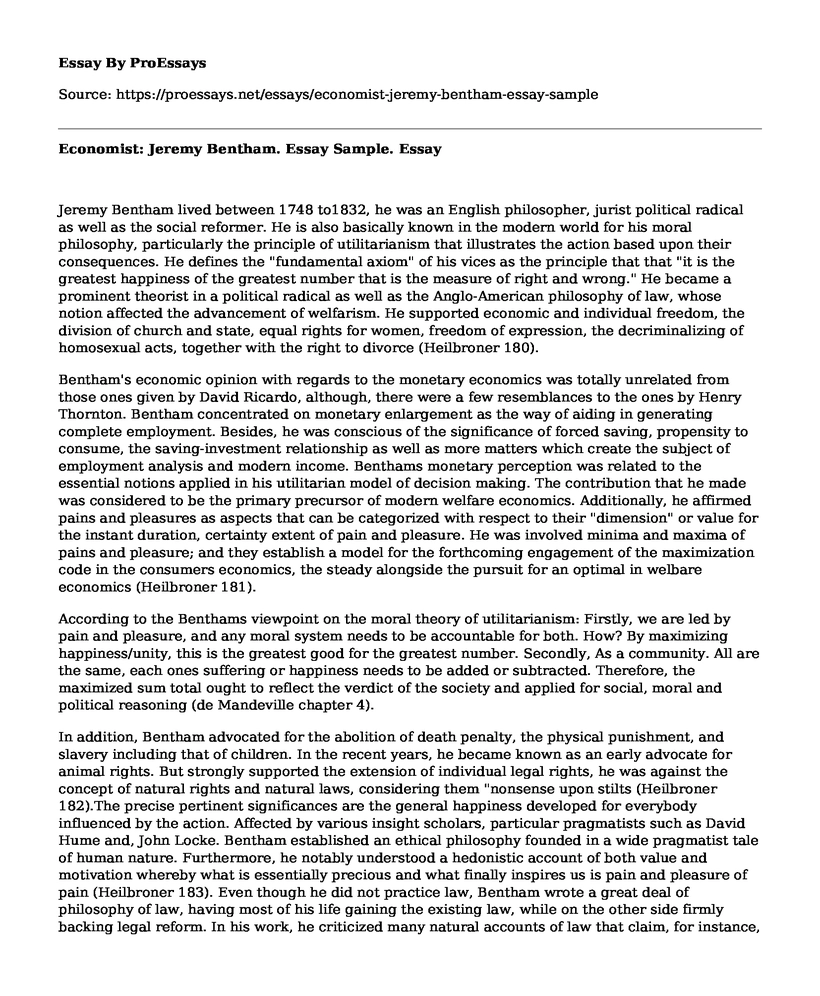Jeremy Bentham lived between 1748 to1832, he was an English philosopher, jurist political radical as well as the social reformer. He is also basically known in the modern world for his moral philosophy, particularly the principle of utilitarianism that illustrates the action based upon their consequences. He defines the "fundamental axiom" of his vices as the principle that that "it is the greatest happiness of the greatest number that is the measure of right and wrong." He became a prominent theorist in a political radical as well as the Anglo-American philosophy of law, whose notion affected the advancement of welfarism. He supported economic and individual freedom, the division of church and state, equal rights for women, freedom of expression, the decriminalizing of homosexual acts, together with the right to divorce (Heilbroner 180).
Bentham's economic opinion with regards to the monetary economics was totally unrelated from those ones given by David Ricardo, although, there were a few resemblances to the ones by Henry Thornton. Bentham concentrated on monetary enlargement as the way of aiding in generating complete employment. Besides, he was conscious of the significance of forced saving, propensity to consume, the saving-investment relationship as well as more matters which create the subject of employment analysis and modern income. Benthams monetary perception was related to the essential notions applied in his utilitarian model of decision making. The contribution that he made was considered to be the primary precursor of modern welfare economics. Additionally, he affirmed pains and pleasures as aspects that can be categorized with respect to their "dimension" or value for the instant duration, certainty extent of pain and pleasure. He was involved minima and maxima of pains and pleasure; and they establish a model for the forthcoming engagement of the maximization code in the consumers economics, the steady alongside the pursuit for an optimal in welbare economics (Heilbroner 181).
According to the Benthams viewpoint on the moral theory of utilitarianism: Firstly, we are led by pain and pleasure, and any moral system needs to be accountable for both. How? By maximizing happiness/unity, this is the greatest good for the greatest number. Secondly, As a community. All are the same, each ones suffering or happiness needs to be added or subtracted. Therefore, the maximized sum total ought to reflect the verdict of the society and applied for social, moral and political reasoning (de Mandeville chapter 4).
In addition, Bentham advocated for the abolition of death penalty, the physical punishment, and slavery including that of children. In the recent years, he became known as an early advocate for animal rights. But strongly supported the extension of individual legal rights, he was against the concept of natural rights and natural laws, considering them "nonsense upon stilts (Heilbroner 182).The precise pertinent significances are the general happiness developed for everybody influenced by the action. Affected by various insight scholars, particular pragmatists such as David Hume and, John Locke. Bentham established an ethical philosophy founded in a wide pragmatist tale of human nature. Furthermore, he notably understood a hedonistic account of both value and motivation whereby what is essentially precious and what finally inspires us is pain and pleasure of pain (Heilbroner 183). Even though he did not practice law, Bentham wrote a great deal of philosophy of law, having most of his life gaining the existing law, while on the other side firmly backing legal reform. In his work, he criticized many natural accounts of law that claim, for instance, the rights, liberty etc. exist sovereign of the government. Therefore, Bentham doubtfully established an early form of what is presently referred to as "legal positivism." Further, then such reviews, he ultimately upheld that applying his moral philosophies into reliable practice would produce outcomes in legal theory by offering the justification of political, legal and social institutions. The influence of Bentham was insignificant during his life. Though his main significance was prominent in the future years of his life and they were passed to his followers like John Austin, John Stuart Mill, together with the other consequentiality (de Mandeville chapter 5).
Bentham was both an obsessive writer as well as a reviser, although, he was a constitutionally incapacitated, apart from a few isolated occasions, of developing his work to completion and publication. Greatly of what was evident in the print in his lifetime was geared for publication by others. Much of his work initially appeared in French translation, all set for the press by Etienne Dumont. Bentham extensively argued that the government policy needs to be obsessed not by ambitions of either a narrow ruling class or monarch but, by the welfare of all people. The focal issue here was to be viewed as how maximization was to consider the utility of the relatively most profited against the utility of these fairly least profited, this means, the relative weights to allocated to the extensive and intensively margins, whether to elevate happiness by maximizing the welfare/utility of the ones who most benefited (Heilbroner 185).
Works Cited
de Mandeville, B. (1724). The fable of the bees (chapter 4 and 5).
Heilbroner, Robert L. "The Worldly Philosophers." The Great Economic Thinkers (1955), pp.180-192
Cite this page
Economist: Jeremy Bentham. Essay Sample.. (2021, Jun 18). Retrieved from https://proessays.net/essays/economist-jeremy-bentham-essay-sample
If you are the original author of this essay and no longer wish to have it published on the ProEssays website, please click below to request its removal:
- Essay Sample on Morality of Capitalism
- Articles Analysis Essay on Economics
- Research Paper on Tiger Adapts to Economic Changes: Overcoming 1997 Crisis
- Essay Example on Maximizing Employee Productivity With Human Resource Strategies
- Essay Example on Foreign Exchange Market: An Illustrative Speculative Auction
- Motivating Employees: Leadership, Focus, and Persistence - Essay Sample
- Essay Example on Unions' Strikes: A Visual Journey







